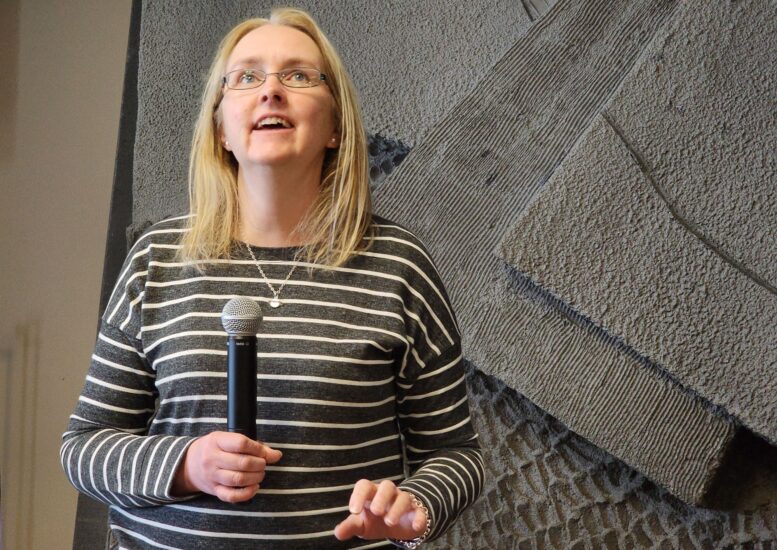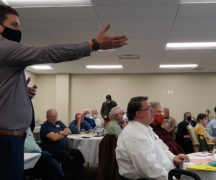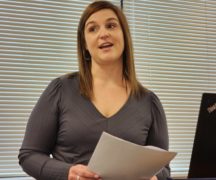By JAN McLAUGHLIN
BG Independent News
Teaching science to eighth graders is like riding a different rollercoaster every day. On Thursday, Bowling Green Middle School teacher Melanie Ferguson took Bowling Green Kiwanis members along for the ride.
Ferguson, who has taught science for 28 years, toyed with conducting a science class on plate tectonics or kinetics for the Kiwanis Club. But then she arrived on the overarching lesson she drills into her young “scientists” every year.
“The world is bigger than you.”
That can be a difficult lesson for young teenagers, who often have trouble seeing anything beyond their small worlds.
Ferguson, selected as an Inspirational Educator by the Kiwanis, spoke to the group about teaching eighth graders. To add realism to her lesson on Thursday, she asked one table of her audience to nap, another to talk amongst themselves, and a few people to fiddle with their cellphones.
When a Kiwanian piped up asking, “Can I go to the restroom,” Ferguson quickly fired back, “I don’t know, can you?”
Ferguson said she realizes that for some students, school is a struggle. So she works hard to give them a reason for coming to her classroom.
“I make it so they want to walk through that door,” she said.
“I urge them to believe they can do what they think they can’t do.”
While Ferguson’s class allows students to explore science, it also teaches the teenagers the skills of patience, compassion, curiosity and a desire to explore.
Patience can be a tricky one for students who are at the “me” and “now” stages of their lives. “Teenagers are infuriating,” she said.
On the rare occasion that she gets to teach elementary students, Ferguson is often struck by how adoring and attentive they are. “That’s such an adrenaline rush,” she said.
But she likes teaching young teens, who are both narrow-minded and wide-eyed.
“I’m where I’m supposed to be,” she said.
And students of all types find they fit in her classroom. Every class has the kids who get all A’s, and stand out during discussions. The silent students often go unnoticed, until they start working in the lab and feel comfortable expressing ideas.
“The quiet ones are often discounted” by fellow students, Ferguson said. “Then in lab, the quiet one bursts out with this idea.” That unleashes a whole bunch of new “glitter bombs” of conversations between different kids.
Ferguson encourages students to be always curious and unafraid to ask questions.
As a child, Ferguson was encouraged to ask questions and explore. At her grandpa’s dairy farm in Putnam County, when the phone rang, it was sometimes a neighbor alerting them to the cows again figuring out how to unlock the gate. They would have to go “wrangle them out of downtown Continental” and bring them home. So the grandkids were given the task of figuring out how to keep the cows from breaking out.
When her grandpa wanted some type of invention that would alert him to visitors at the farm, the grandkids were charged with creating something noisy and naming it appropriately. They came up with the “tintinnabulator.”
Ferguson wants to “open up that faucet” for her students. She wants them to discover why rainbows only occur in the mornings or evenings, or why rain sometimes falls upward by tall buildings.
Though she has taught many of the same science topics for the last 28 years, she never teaches them the same way – always finding ways to improve.
And when students pose questions to her, Ferguson is honest.
“I have no problem admitting I don’t have a clue,” she said. That leads to “how can we figure it out,” with lessons on how to find valid reputable sources of information.
When students inevitably complain about some science topics, saying “I’m never going to use this,” Ferguson points out the need to understand how to jump a car’s battery, or how to make popcorn.
Over the years, her students await “popcorn day,” when they learn how conduction heat makes Jiffy Pop, convection makes air-popped, and radiation heat makes microwave popcorn.
“All the other teachers are jealous,” because her classroom smells so good that day.
Ferguson also encourages her students to travel – even if it’s just by exploring far away places in class.
“Some have never left Bowling Green,” or haven’t ventured past Portage to the south and Perrysburg to the north.
At the end of the school year, when eighth graders go to a MudHens game, some of the students are amazed at the 5/3 Building in downtown Toledo. “It’s the biggest thing they’ve ever seen.”
Again, lesson learned – “the world is bigger than Bowling Green.”
Ferguson is pumped for the upcoming eclipse on April 8, when everyone connected with Bowling Green City School District will be equipped with eclipse glasses to view the phenomenon safely.
“Which I could not be more excited about,” she said.
Ferguson wants to plant seeds in her students to be inspired themselves about the eclipse, a newly discovered word, or the person next to them.
“We need to keep learning,” she said.
Melanie Ferguson’s husband, Bill, who teaches seventh grade English at BGMS, was recognized as an Inspirational Teacher by the Kiwanis in 2022.



